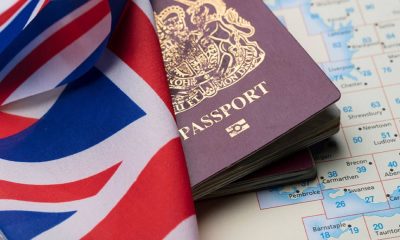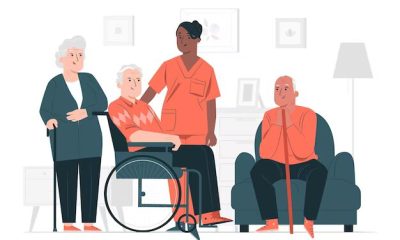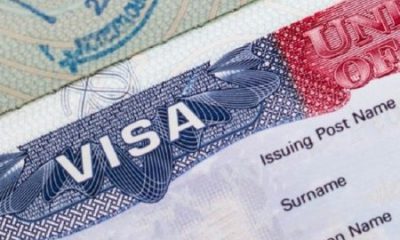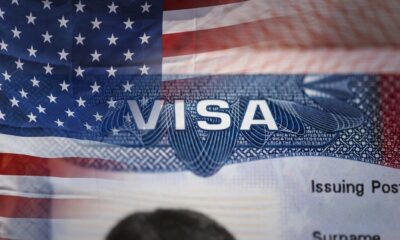Visa
K1 Adjustment Of Status: K1 Visa To Green Card, Application & More
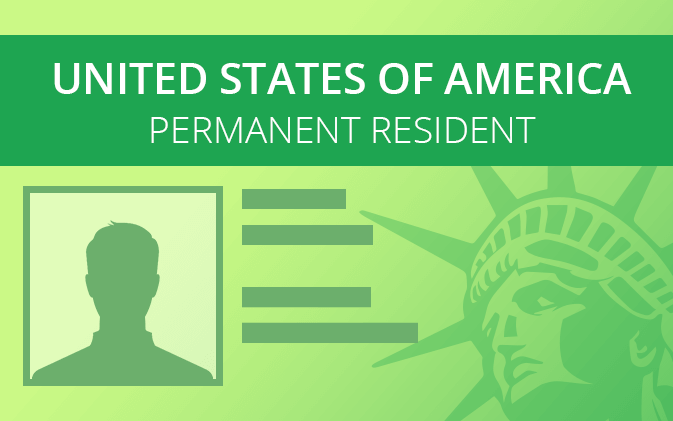
People in the U.S. who want legal permanent residence file for an adjustment of status. A K-1 adjustment of status is needed to convert a K-1 visa to a green card when your fiancé marries you within 90 days. After entering the US, the foreign fiancé can apply for their Social Security Number and Employment Authorization Documents, which are good for the validity period.
This tutorial will guide you from K-1 visa holder to green card holder via the lengthy process.
Application Process for K-1 Adjustment of Status
You need to file a K-1 adjustment of status before the end of the 90 days of stay. In other words, you should file for an adjustment of status before the I-94 expires.
To receive authorization for permanent residency or a green card, you must file and complete the following documents.
K-1 Visa to Green Card: Application to Adjust Status (Form I-485)
To modify their K-1 visa status, the foreign national spouse must file an I-485 application after the marriage and within 90 days of arrival. To avoid the accrual of an unlawful presence, we strongly advise persons to file within 90 days of their stay. Nothing prevents you from applying after the 90-day window has passed as long as the marriage occurs inside the 90-day window.
If you do not marry within 90 days, you must leave the country and are ineligible to apply for adjustment of status or any other non-immigrant category.
The form covers the following topics.
- Biographical information about yourself
- Address history
- Immigration history
- Noting whether you are the principal or derivative applicant
- Visa category
- Employment history
- Information about your parents
- Marital history
- Information about any children you might have
- Demographic information
- Questions regarding eligibility
- Memberships in any organizations, associations, foundations, political parties, militaries, or similar groups either in the U.S. or abroad
- Criminal history
- Espionage and security information
- Public charge information
- History of illegal entries
- Disability information
- Information regarding any interpreters or legal representatives you used to complete the form
The filing fee is $1,140.
Processing times can be much longer if your forms are completed incorrectly. More than that, you risk rejection and denial of your application if certain documents are missing.
Affidavit of Support (Form I-864):
Form I-864 proves the immigrant has enough money to not be a public burden. The citizen spouse must also submit a paper proving they will assist their immigrant spouse if they cannot. The minimum income to sponsor someone depends on poverty and household size. If the citizen spouse’s salary is below the minimum, a co-sponsor is needed. All affidavit of support submitters must provide proof of income, cash, current tax returns, and W2 Forms.
The form covers the following topics.
- Basic information about the immigrant you’re sponsoring—your finacé
- Your address information
- Sponsor’s citizenship or legal permanent residency information
- Household size
- Employment information
- Income information
- Asset information
- Information regarding any interpreters or legal representatives you used to complete the form
Report of Medical Examination and Vaccinations (Form I-693)
K-1 visa to green card applicants must file form I-693 and K-1 Adjustment of Status. The foreign fiancé must be examined by a USCIS-authorized medical examiner. The same doctor should also vaccinate. Find a USCIS-approved doctor via USCIS Find A Doctor.
If the applicant took the medical exam more than a year before the adjustment of status application or had complications, USCIS may require a new exam. If this applies to you, see an immigration attorney.
The medical exam includes a physical and mental evaluation, drug and alcohol screening, various medical tests, and a review of your medical history. Bring the following evidence with you to your exam.
- Immunization and vaccination records
- Copies of any chest x-rays
- A copy of your medical history
- Treatment plans for any medical conditions
The exam helps USCIS determine if you fall under any health-related grounds of inadmissibility.
The results are sealed, and applicants should submit them to USCIS unopened.
The fee is dependent on the price the doctor charges. If you have health insurance, make sure to bring your health insurance card to the appointment.
Medical Exam Not Always Required
If you received a medical exam during the consular stages, you might not be required to obtain another one. The following conditions would exempt you from getting a second medical exam:
- You filed Form I-485 within one year of your medical exam that you received abroad
- The original medical exam did not indicate that you have a Class A medical condition
- You have a waiver of inadmissibility for those identified with a Class A medical condition
You must establish vaccination compliance even if you are excused from retaking the medical exam. Include the DS 3025 immunization record with the original medical checkup report. If not, a doctor must write the vaccine report. Suppose the original medical exam takes a long time to arrive at the U.S. consulate. In that instance, your lawyer may suggest a new medical check to speed up your adjustment of status.
Application for Employment Authorization Document (Form I-765)
An employment authorization paper lets the foreign spouse work in the US. As a spouse, you can apply for employment authorization after entering the country. You can also get a Social Security number right now.
The job permission document is Form I-766, however you must apply with Form I-765. The form asks for your eligibility, alien registration number, and proof of your most recent arrival into the nation, like the I-864 and I-485. Submit your visa and I-797C Notice of Action.
The Form I-765 filing fee is $410.
Application for Travel Document (Form I-131)
Use Form I-131 to apply for your travel permit. If you submit both the I-765 and I-131 along with the K-1 Adjustment of Status application, then USCIS will concurrently issue advance parole and the travel permit.
Along with the information requested in the previous forms, Form I-131 also asks for the following.
- Intended trip departure date
- Expected length of stay
- Trip purpose
- Countries visiting during travel
- The number of trips you will use the travel permit for
The filing fee for Form I-131 is $575.
Other Required Documents
You should also submit copies of the following documents with the K-1 Adjustment of Status application:
- I-129F Approval Notice
- Biographic page of the foreign spouse’s passport
- Foreign spouse’s K-1 visa and I-94 arrival/departure records
- Foreign spouse’s birth certificate. If applicable, you must also submit an English translation.
- Marriage certificate
- You must also submit copies of previous divorce decrees and English translations (if applicable).
- Four passport-sized photos
- Copy of EAD card (if available) along with I-765
K-1 Adjustment of Status Interview 2023
The K-1 adjustment of status interview at the USCIS office is the final step in the process. During this interview, the officer will ask questions to confirm the legitimacy of the marriage. Many of the questions may be similar to those asked during the initial K-1 visa interview. The following are some examples of documentation that prove a marriage is legal:
- Photographs of the couple together
- Mortgage documents or leases
- Bank account statements
- Credit card statements
- Proof of joint ownership of property (i.e., cars, furniture, homes, etc.)
Along with confirming marriage legitimacy, the USCIS officer demands accurate forms and evidence. The interviewer should be kind and accommodating, although you may be nervous. You don’t need to memorize anything you contributed. Telling the interviewer you don’t remember the answer is crucial. Not lie. Red flags include differences between your answers and submission.
Sample Questions
Questions during the interview will cover topics regarding personal biographical information, questions about your fiancé, your relationship, and your wedding. Below are some sample questions that you might hear.
- Have you been married before? If yes, when did the relationship end, and why?
- Have you ever been convicted or arrested for a crime?
- Have you visited the U.S. before?
- What do you do for a living?
- Have you traveled outside of your home country before?
- Where does your fiancé work?
- What are your fiancé’s hobbies?
- How many siblings does your fiancé have?
- Have you met your fiancé’s parents?
- Where did your fiancé go to school?
- What did your fiancé study in school?
- Do you know your fiancé’s phone number?
- What language does your fiancé speak? Do you understand it?
- How many rooms are in your fiancé’s home?
- Does your fiancé live with anyone else?
- Who is your fiancé’s best friend?
- How did you both meet?
- Where was the first date?
- When did the relationship turn romantic?
- Have you both vacationed together before?
- Have you spent any holidays together?
- How did the proposal occur?
- When was the wedding happen?
- Where did the wedding take place?
- How many people attended the wedding?
- Did your parents be attending the wedding?
- Who were the bridesmaids and groomsmen?
- What kind of wedding attire did you both wear?
- If you had a honeymoon, where did you go?
- If your spouse has children, have you met them?
- How will you handle the finances and budget in the family?
- Do you plan to have children together?
K-1 Visa to Green Card Processing Time
Form I-485 processing time is determined by various factors, including your case facts, which service center processes your case (backlogs are common right now), and the accuracy with which you filed your adjustment of status documents. You will receive a receipt notification from USCIS about 2-3 weeks after filing your Form I-485, indicating that they received your application.
If You Did Not File Form I-485 Properly
If you did not file your I-485 correctly, you would receive a Notice of Action to reject the application. USCIS denies roughly 11% of applications. Alternatively, you may receive a Request for Evidence (RFE). Both will add processing time to your case, which you can often avoid by hiring a professional.
Typically the timeframe for your adjustment of status application to process is eight to fourteen months. Remember that you can always check your exact case status online.
Notice for Biometric Appointment
After submitting your Adjustment of Status application, you should receive a notice with the date and location of your biometric appointment (usually at the nearest USCIS Application Support Center near you). At your visit, you will be fingerprinted for a criminal background check and asked to sign several forms. Bring a government-issued photo identification to your appointment. You can obtain a passport, driver’s license, military identification, or state-issued identification. The I-485 biometric service fees are listed below.
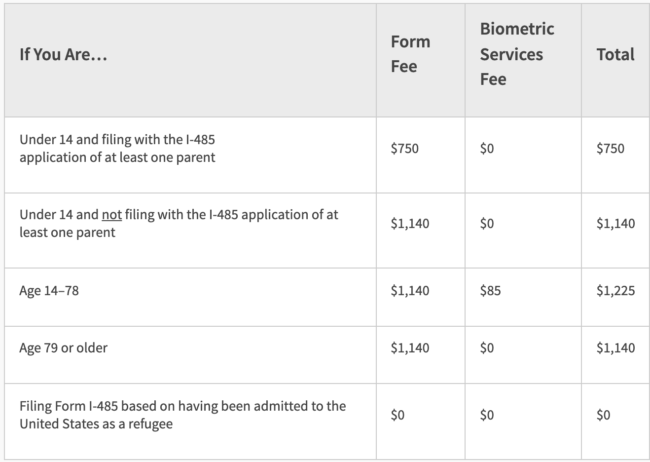
Summary of Steps to Apply for K-1 Visa Adjustment of Status
- File Form I-485 along with supporting documents
- Biometrics Appointment
- K-1 Visa Adjustment of Status Interview
- Once the Adjustment of Status application is approved, you will receive your conditional green card (valid two years as a measure to deter green card fraud)
- File Form I-751, Petition to Remove Conditions on Residence, 90 days from when the conditional green card expires
- Receive permanent resident card (lasts ten years). Permanent residents who would like to apply for citizenship after three years of marriage will have the two-year conditional residence applied toward the requirement.
K-1 Visa Status Frequently Asked Questions
How long can you stay on a K-1 visa?
When you enter the United States on a K-1 Visa, you must marry within 90 days. To receive a green card, you must go through the AOS process. In contrast, you can apply for a green card outside the United States through consular processing. You must remain outside of the United States until your green card application is approved.
What is needed for K-1 adjustment of status?
You must first file Form I-485 and the accompanying documentation indicated in the preceding section. To avoid illegal presence, do this after the marriage but within 90 days. The I-693, Report of Medical Examination and Vaccination Record, Form I-864 Affidavit of Support, I-131 if you intend to travel or work in the country before obtaining permanent residency, and I-765, Application for Employment Authorization are the other documents you will need to complete.
How long does K-1 adjustment of status after marriage take?
It can take anywhere from ten to thirteen months for the AOS process via marriage to a U.S. citizen. If your partner is a U.S. green card holder, it could take anywhere from 29-38 months. One of the most significant factors that will dictate processing time apart from your details is which USCIS processing center handles your case and their backlogs.
How much income do I need to sponsor a K-1 visa?
The 2021 poverty guidelines require K-1 visa petitioners to earn at least 417,240 (excluding Alaska and Hawaii residents). This prevents the foreign fiance from becoming a U.S. government liability. Submitting the I-134 Affidavit of Support guarantees that you will reimburse public benefits if the foreign fiance needs government aid. If your income is insufficient, a co-sponsor can petition them.

